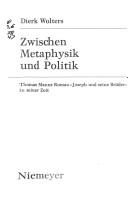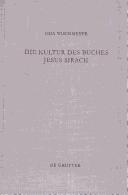| Listing 1 - 4 of 4 |
Sort by
|

ISBN: 3484181478 3110891735 9783484181472 Year: 1998 Volume: 147 Publisher: Max Niemeyer Verlag
Abstract | Keywords | Export | Availability | Bookmark
 Loading...
Loading...Choose an application
- Reference Manager
- EndNote
- RefWorks (Direct export to RefWorks)
Thomas Manns Roman "Joseph und seine Brüder", der zwischen 1926 und 1942 entstand, spielt vor 3000 Jahren. Gewöhnlich liest man ihn deshalb so, als sei er seinem politikskeptischen Autor Zufluchtstätte vor den Widrigkeiten der Weimarer Republik und des Nationalsozialismus gewesen: Mann habe sich hier in einer fernen, intakten und unpolitischen Welt eingerichtet. Eine Auseinandersetzung mit der Zeitgeschichte wird allenfalls dem letzten Teil der Tetralogie zugebilligt, in dem Joseph Staatsmann wird. Hingegen zeigt diese Arbeit, daß der Roman sich von der ersten Seite an mit den politischen Anforderungen beschäftigt, denen der bis 1918 bekennende Unpolitische nicht mehr ausweichen kann. Er ist aufs engste mit seiner Entstehungszeit verknüpft. Diese Auseinandersetzung vollzieht sich auf der Ebene von Thomas Manns philosophischer Heimat. Bis 1918 begründete er seine unpolitische Haltung mit Schopenhauers Metaphysik, nach der Fortschritt generell unmöglich ist. Von diesem metaphysischen Glaubensgrund des politisch immer stärker Bedrängten ausgehend, sucht der Roman jedoch durchgängig nach einem Weg, der Welt aktiv gegenüberzutreten. Parallel zur zeitgeschichtlichen Eingebundenheit Thomas Manns zeichnet "Joseph und seine Brüder" die Gedankenexperimente nach, die der Autor in höchster Not unternimmt. Ehrlicher als die oft von volkspädagogischen Zwängen gelenkten zeitgeschichtlichen Essays zeigt der Roman, wo die Möglichkeiten und politischen Grenzen von Thomas Manns Denken liegen.
Mann, Thomas, --- Mann, Thomas --- Political and social views --- Views on national socialism --- Germanic Literature --- Languages & Literatures --- Mann, Thomas, - 1875-1955 - Joseph und seine Brüder --- Mann, Thomas: Joseph und seine Brüder. --- Zeithintergrund. --- Zeithintergrund --- LITERARY CRITICISM / European / German. --- Historischer Hintergrund --- Geschichtlicher Hintergrund

ISBN: 3110145642 3111810909 3110870762 9783110145649 Year: 1995 Volume: 77 Publisher: Berlin de Gruyter
Abstract | Keywords | Export | Availability | Bookmark
 Loading...
Loading...Choose an application
- Reference Manager
- EndNote
- RefWorks (Direct export to RefWorks)
Bible --- Criticism, interpretation, etc --- 223.7 --- Wijsheid. Wijsheid van Jesus Sirach (Ecclesiasticus) --- Bible. --- Ben Sira (Book of the Apocrypha) --- Book of Ben Sira (Book of the Apocrypha) --- Book of Sirach (Book of the Apocrypha) --- Ecclesiasticus (Book of the Apocrypha) --- Ḥokhmat Shimʻon ben Sira (Book of the Apocrypha) --- Ḥokhmat Yehoshuʻa ben Sira (Book of the Apocrypha) --- Jesus Sirach (Book of the Apocrypha) --- Sefer Ben Sira (Book of the Apocrypha) --- Sefer Ḥokhmat Yehoshuʻa ben Sira (Book of the Apocrypha) --- Sirach (Book of the Apocrypha) --- Sirachbuch (Book of the Apocrypha) --- Wisdom of Ben Sira (Book of the Apocrypha) --- Wisdom of Jesus the Son of Sirach (Book of the Apocrypha) --- Wisdom of Sirach (Book of the Apocrypha) --- Words of Simeon ben Jeshua (Book of the Apocrypha) --- Criticism, interpretation, etc. --- Sirach ‹Buch›. --- Zeithintergrund. --- Zeithintergrund --- RELIGION / Biblical Criticism & Interpretation / Old Testament. --- Historischer Hintergrund --- Geschichtlicher Hintergrund
Book
ISBN: 9783515125642 3515125647 9783515125697 3515125698 Year: 2020 Volume: 261 Publisher: Stuttgart : Franz Steiner Verlag,
Abstract | Keywords | Export | Availability | Bookmark
 Loading...
Loading...Choose an application
- Reference Manager
- EndNote
- RefWorks (Direct export to RefWorks)
Die 'Rhetorik' des Aristoteles ist von fundamentaler Bedeutung für die Geschichte der Rhetorik nicht nur der griechisch-römischen Antike, sondern auch der nachfolgenden Epochen bis in die Moderne. Gleichwohl handelt es sich bei ihr nicht etwa um einen Versuch, den Gegenstand zeitübergreifend zu fassen; vielmehr situiert Aristoteles die öffentliche Rhetorik in den Poleis seiner Zeit und den dortigen kommunikativen Settings. Allerdings bildet er diese nicht einfach ab, sondern positioniert sich hierzu in einem diskursiven Verhältnis. Karen Piepenbrink untersucht erstmals systematisch die Relation der Schrift zu ihrem historischen Kontext, speziell zur praktischen Rhetorik. Sie fragt hierbei nach Parallelen wie auch Differenzen und beleuchtet diese im Hinblick auf ihre Ursachen. Dabei nimmt Piepenbrink die Frage nach der Intention des Textes ebenso in den Blick wie soziopolitische und rezeptionsästhetische Aspekte, aber auch mögliche philosophische Prämissen des Autors.
Rhetoric
---
Philosophy
---
Philosophy.
---
Aristotle
---
Criticism and interpretation.
---
Aristote (0384-0322 av. J.-C.).
---
Aristotle.
---
Critique et interprétation.
---
Rhetoric, Ancient
---
Rhetoric (Aristotle).
---
Aristote
---
E-books
---
Zeithintergrund
---
Rhetorik
---
Aristoteles
---
(Produktform)Electronic book text
---
4. Jh. v. Chr.
---
Aischines
---
Alte Geschichte
---
Anaximenes von Lampsakos
---
Athen
---
Demokratie
---
Demosthenes
---
Gericht
---
Kommunikation
---
Philosophie
---
Polis
---
Sophistik
---
Volksversammlung
---
(VLB-WN)9553
---
Beredsamkeit
---
Redekunst
---
Redetechnik
---
Rede
---
Redner
---
Vortragstechnik
---
Historischer Hintergrund
---
Geschichtlicher Hintergrund
---
Arystoteles
---
Arestoteles
---
Arasṭū
---
Aristū
---
Arisṭū
---
Arisṭāṭālīs
---
Aristotelʹ
---
Yalishiduode
---
Aristotelus
---
Pseudo Aristotele
---
Pseudo Aristóteles
---
Ps-Aristoteles
---
Pseudoaristoteles
---
Aristóteles
---
Aristotelis
---
Aristüţālis
---
Aristotelēs
---
Arisṭūṭālīs
---
Aristotel
---
Pseudo-Aristoteles
---
Aristotele
---
Pseudo-Aristote
---
Pseudo-Aristotele
---
Aristotile
---
Aristòtil
---
Αριστοτελης
---
Philosoph
---
Lehrer
---
Aristotelismus
---
Stagira
---
Chalkide
---
Possel, Johann
---
Camerarius, Joachim
---
Priscianus
---
Toxites, Michael
---
Cassius
---
Borrhaus, Martin
---
Matthisius, Gerard
---
Michael
---
Fonseca, Pedro <
Book
ISBN: 3110498871 3110500884 311050054X Year: 2017 Publisher: De Gruyter
Abstract | Keywords | Export | Availability | Bookmark
 Loading...
Loading...Choose an application
- Reference Manager
- EndNote
- RefWorks (Direct export to RefWorks)
The Song of Songs, a lyric cycle of love scenes without a narrative plot, has often been considered as the Bible's most beautiful and enigmatic book. The present study questions the still dominant exegetical convention that merges all of the Song's voices into the dialogue of a single couple, its composite heroine Shulamit being a projection screen for norms of womanhood. An alternative socio-spatial reading, starting with the Hebrew text's strophic patterns and its references to historical realia, explores the poem's artful alternation between courtly, urban, rural, and pastoral scenes with their distinct characters. The literary construction of social difference juxtaposes class-specific patterns of consumption, mobility, emotion, power structures, and gender relations. This new image of the cycle as a detailed poetic frieze of ancient society eventually leads to a precise hypothesis concerning its literary and religious context in the Hellenistic age, as well as its geographical origins in the multiethnic borderland east of the Jordan. In a Jewish echo of anthropological skepticism, the poem emphasizes the plurality and relativity of the human condition while praising the communicative powers of pleasure, fantasy, and multifarious Eros.
Amman. --- Dionysos. --- Dionysus. --- Hellenistic Judaism. --- Hohelied. --- Song of Songs. --- hellenistisches Judentum. --- Sozialgeschichtliche Exegese --- Zeithintergrund --- RELIGION / Biblical Reference / Language Study. --- Historischer Hintergrund --- Geschichtlicher Hintergrund --- Sozialwissenschaftliche Exegese --- Exegese --- Dionysus --- Bible. --- Criticism, interpretation, etc. --- Bacchus --- Bakchos --- Dionís --- Dionisas --- Dioniso --- Dionīss --- Dionisu --- Dioniz --- Dionizi --- Dionizo --- Dionizos --- Dionüszosz --- Dionysos --- Dionýzos --- Diyonizosse --- Διόνυσος --- Дионис --- ديونيسوس --- 디오니소스 --- דיוניסוס --- ディオニューソス --- 狄俄倪索斯 --- Βάκχος --- Діоніс --- Aga-sŏ (Book of the Old Testament) --- Asma Asmatōn (Book of the Old Testament) --- Cantar de los Cantares de Salomón (Book of the Old Testament) --- Cântarea-a Cântărilor (Book of the Old Testament) --- Cantica Canticorum (Book of the Old Testament) --- Canticle of Canticles (Book of the Old Testament) --- Canticles (Book of the Old Testament) --- Cantico dei Cantici (Book of the Old Testament) --- Canticum Canticorum Salomonis (Book of the Old Testament) --- Cantique des Cantiques (Book of the Old Testament) --- Énekek Éneke (Book of the Old Testament) --- Erg Ergotsʻ Soghomoni (Book of the Old Testament) --- Hohelied (Book of the Old Testament) --- Hooglied (Book of the Old Testament) --- Lied der Lieder (Book of the Old Testament) --- Musthikaning Kidung anggitane Sang Prabu Suleman (Book of the Old Testament) --- Musthikaning Kidung (Book of the Old Testament) --- Nashīd al-Anāshīd (Book of the Old Testament) --- Nashīd al-Anshād (Book of the Old Testament) --- Shir ha-Shirim (Book of the Old Testament) --- Solomon, Song of (Book of the Old Testament) --- Song of Solomon (Book of the Old Testament) --- Song of Songs (Book of the Old Testament)
| Listing 1 - 4 of 4 |
Sort by
|

 Search
Search Feedback
Feedback About UniCat
About UniCat  Help
Help News
News